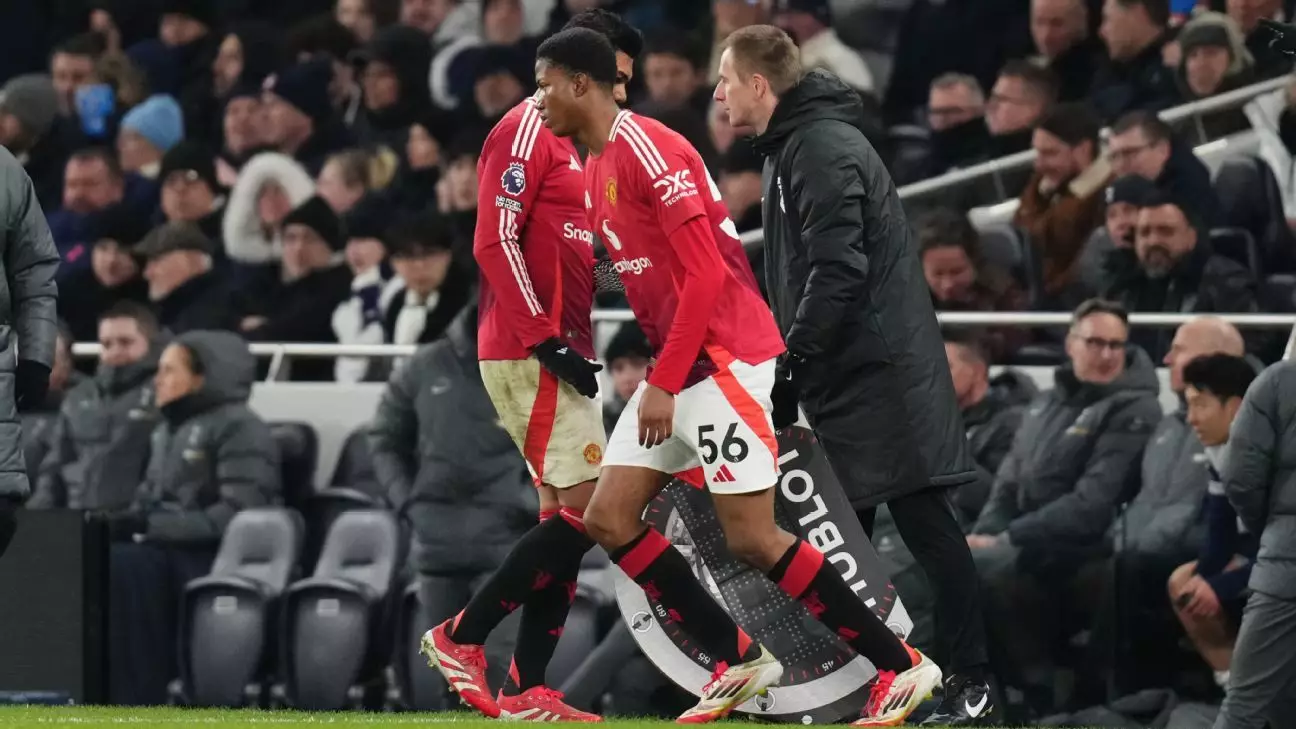In the annals of Manchester United’s rich football history, the introduction of young talent has often ignited excitement and hope among supporters. Moments like Federico Macheda’s unforgettable strike against Aston Villa in 2009 or Marcus Rashford’s electrifying debut against Arsenal in 2016 continue to resonate with fans, serving as high watermarks for the club’s youth development program. However, that tradition seems to be fraying at the edges amidst the current turmoil. The recent decision by head coach Ruben Amorim to field 17-year-old Chido Obi-Martin during a must-win game against Tottenham serves as a poignant reminder of how dramatically the landscape has shifted. Rather than a triumphant rite of passage, Obi-Martin’s debut ended without so much as a touch of the ball, encapsulating the desperation felt within the Manchester United camp.
The plight of United’s youth system is compounded by a plethora of injuries, leaving the club with a remarkable 12 players absent from the squad. With this backdrop, Amorim’s inclination to throw a teenager into a crucial fixture raises eyebrows and questions about strategy. While the focus should be on nurturing young talent, circumstances have transformed what was once a hallmark of Manchester United’s success into an act of almost reckless abandonment. Historically, the club has taken bold bets on youth, allowing young players to gain valuable experience while supporting the first team. But the introduction of Obi-Martin with a match hanging in the balance feels like a hasty gamble rather than a carefully calculated move.
Amorim’s justification was rooted in the belief that Obi-Martin could be the spark that made a difference; however, one must wonder if such an important moment was the ideal platform for a rookie. Should he have been given a more advantageous opportunity to showcase his talents? A more gradual introduction may have been prudent, allowing the young striker to transition into senior football without the burden of immediately steps into a losing effort.
The match against Tottenham highlighted a deeper malaise infecting the United camp. While they mounted a lackluster response during the second half, buoyed by a fragile Tottenham side, the defeat marked another bitter milestone in an already calamitous season. The statistics speak volumes: 12 defeats in their opening 25 league games signal a repetitive narrative that paints the season in increasingly dark hues. It’s a level of performance that evokes memories of their relegation struggles in the 1973-1974 season.
The current squad, once a bastion of experience and skill, now resembles a shadow of its former self—an unwelcome paradox for a club of such golden pedigree. In Amorim’s plea to divert focus from the larger crisis, one can’t help but perceive a denial of the sharp realities confronting the team. Realistically, languishing in 15th place does not merely suggest misfortune but raises existential questions about the club’s future direction.
The Ripple Effect on Opponents
For Tottenham, the outcome of the match served as a temporary reprieve amidst mounting scrutiny surrounding coach Ange Postecoglou’s management. While his commitment to an expansive playing style may not have ushered in a resounding victory, it offers glimmers of hope as the squad slowly returns to full fitness. The juxtaposition of United’s woes against Spurs’ resurgence sheds light on football’s merciless nature; successes attained through experience and strategic foresight sharply contrast with a club struggling for coherence.
As fans gathered outside the Tottenham stadium to express their dissatisfaction with chairman Daniel Levy, it became apparent that discontent simmers beneath the surface of rival clubs too. Such broad-based unrest in the face of adversity reveals a collective sentiment among both fanbases: the hunger for progress and renewal in an age of uncertainty.
Charting a Way Forward
As United navigates this season’s upheaval, the looming questions center around the future of their youth policy and whether the current leadership can strike the right balance between development and immediate results. The club must reconsider its approach, ensuring that young talents are not thrust into the furnace of pressure prematurely, risking their potential futures.
For now, there may be no easy solutions or instant remedies to the turmoil enveloping Manchester United. However, clarity in vision and strategy might allow them to rebuild and once again harness the undercurrents of youth that had propelled them to the heights of English football. In doing so, they must unearth a renewed sense of purpose—one that respects the legacies of the past while navigating the uncertain waters of tomorrow.

Leave a Reply